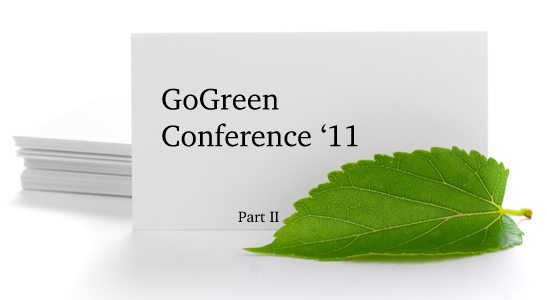In the first part of the GoGreen Conference ’11 coverage, we reported that sustainability education and patience were the buzzwords of many of the panel discussions. Here’s why:
The panel discussion titled “Green Your Workplace: High Impact Change at Your Business,” moderated by Ed Fox, chief sustainability officer for APS, focused on how to turn the idea of going green and sustainability into governance. This challenge small and large businesses face was the topic of discussion among the panel, which included:
|
|
|
|
Fox began the discussion asking the panelists how one would convince the leaders of companies to pursue incorporating green elements into the workplace.
Floyd suggested offering incentives and marketing materials and free literature to spur interest. Lindo agreed providing incentives to employees will help encourage them to make the changes second nature. She also suggested owners become educated themselves and have a strong advocate in the office.
Walker took a different approach and said reducing consumption to afford sustainability is one step a business can consider taking. The company must be efficient and through this efficiency, it will convince others that the extra cost will be worth it.
Walker continued to say that it helps to know all the benefits of turning your particular business green — environmental, economical, etc. — and know your audience.
“Ninety percent of clients are bottom-line driven,” Dunn said. They want to save energy and save money, he added. Two ways companies can do this is by making their own operations more efficient (switching your lighting to LED, for example) while also anticipating changes in the marketplace.
Dunn also said behavioral modifications must take place. You can switch to LED, but the appropriate actions must be taken by the staff, i.e. remembering to turn off the lights.
But what was stressed was the acceptance of risk. While making your business more environmentally friendly and sustainable will help you save money in the long run, it will take some time to get there with few obvious returns. Or, as Fox put it, the few “low hanging fruit.”
In the following discussion, “Applying Sustainabilty Best Practices to Impact Community Equity and Diversity,” moderated by Dr. George Brooks, owner of Southwest Green and NxT Horizon Group and including Greg Peterson, founder of Urban Farm; Diane Brossart, president of Valley Forward; and Rosanne Albright, Brownfields Project Manager of the City of Phoenix, regenerative sustainability was the hot topic as well as education.
“Nature regenerates itself, not just sustains itself,” Peterson said. “Education is the key piece to sustainability.
Urban farming (or growing and sharing food), recycling land via the Brownfields Land Recycling Project, and the importance of parks and open space in the state were all covered in this discussion.
“Energy, food, health, poverty — they are all connected,” Brooks said. “Local sourcing and urban farms can help offset the costs of energy.”
Peterson’s final thoughts?
“It’s really a grassroots movement,” he said. “For those of you in the government, get out of our way.”
Visit the GoGreen Conference website at gogreenconference.net.




